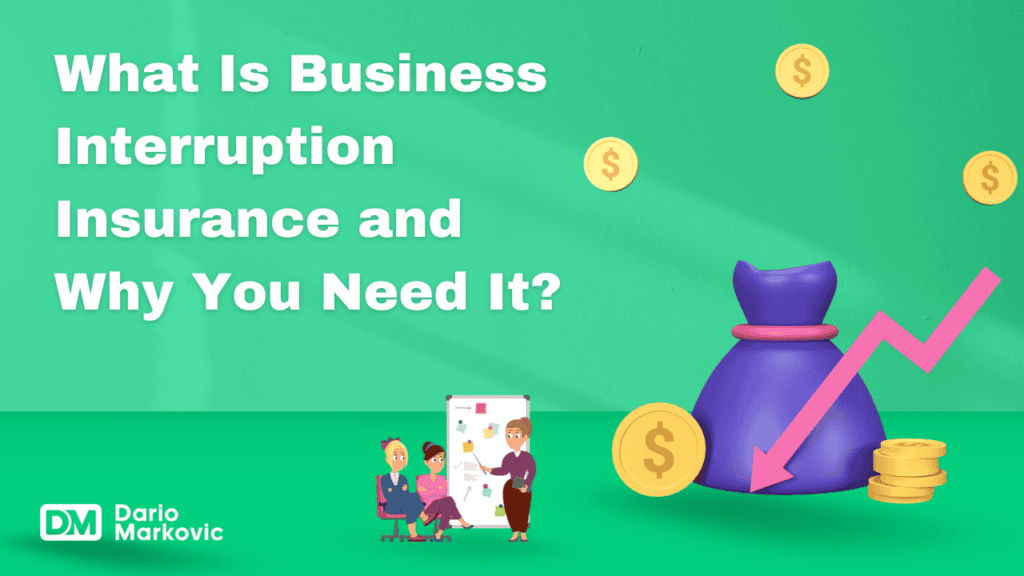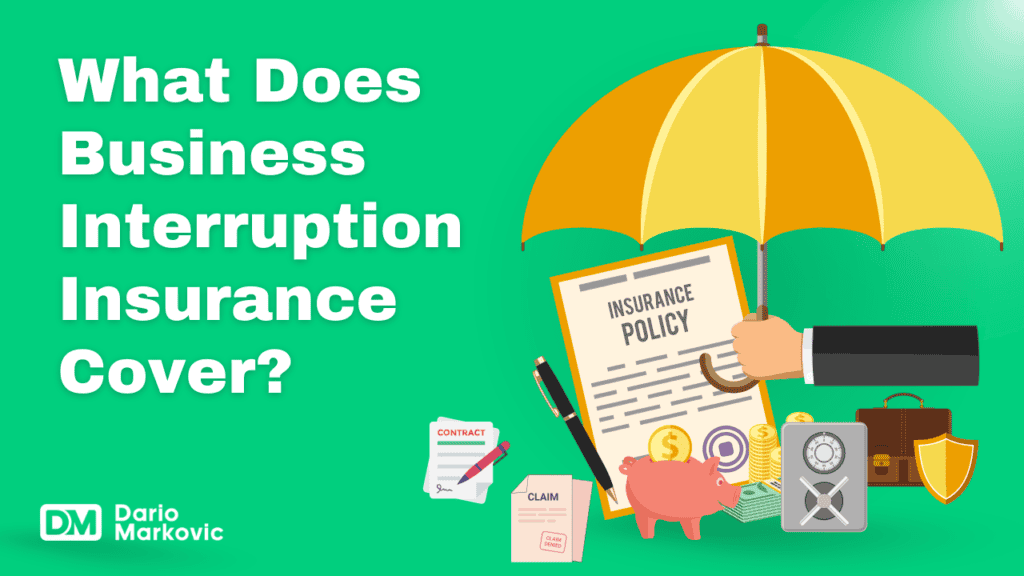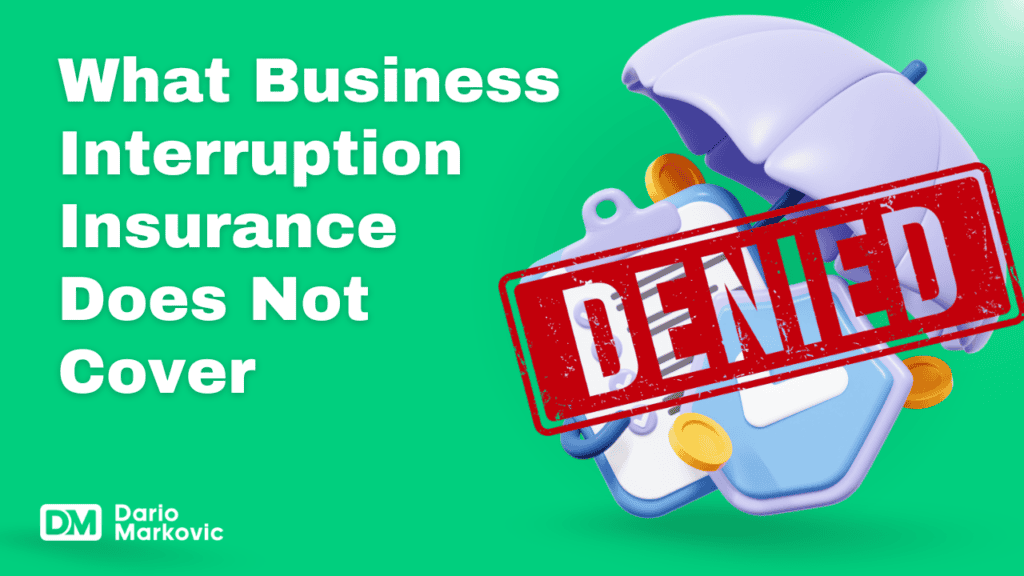When you pour your heart and soul into building a business, you want to protect it. You probably have property insurance to cover physical assets, but what about your income? What is business interruption insurance, and how can it save the day? This often-overlooked coverage can be a lifesaver if a disaster or unexpected event temporarily forces you to close your doors.
 Imagine this: a fire damages your storefront, forcing you to shut down for repairs. Bills pile up—rent, utilities, employee wages—while your income screeches to a halt. This is where business interruption insurance covers your assets.
Imagine this: a fire damages your storefront, forcing you to shut down for repairs. Bills pile up—rent, utilities, employee wages—while your income screeches to a halt. This is where business interruption insurance covers your assets.
It helps cover those ongoing expenses and even lost income to bounce back. In other words, what is business interruption insurance? Knowing you can worry-free from the storm and rebuild your business without financial ruin is worth reading this blog piece.
What Does Business Interruption Insurance Cover?
 Business interruption insurance is like a safety net for your income stream. But it’s important to understand exactly what it covers. Most policies typically include:
Business interruption insurance is like a safety net for your income stream. But it’s important to understand exactly what it covers. Most policies typically include:
-
- Lost Profits: Reimbursement for profits you would’ve earned if the interruption hadn’t happened.
-
- Fixed Costs: This includes expenses like rent or mortgage payments, utilities, and taxes that keep coming even when your business isn’t operating.
-
- Operating Expenses: Coverage for necessary costs incurred to minimize further loss or continue operations, like renting a temporary space or equipment.
-
- Employee Wages: If keeping your employees is a top priority, this coverage can help you continue paying them during the shutdown.
What Business Interruption Insurance Does Not Cover
 While business interruption insurance offers broad protection, it doesn’t cover everything. Common exclusions include:
While business interruption insurance offers broad protection, it doesn’t cover everything. Common exclusions include:
-
- Flood or Earthquake Damage: You usually need separate policies for these perils.
-
- Undocumented Income: If you haven’t accurately tracked and reported your earnings, you will unlikely be reimbursed.
-
- Pandemics and Communicable Diseases: Standard policies generally do not cover losses stemming from pandemics like COVID-19, and most insurers added explicit exclusions for such events. Remember, reviewing your specific policy’s language is essential.
-
- Broken items: Similar to flooding or earthquakes, items like glass will be covered under your commercial property insurance, not and not business interruption coverage. Your business interruption coverage would cover the lost income while repairs are done.
Types of Business Interruption Coverage
You’ll learn that what is business interruption insurance is not one-size-fits-all. Different variations exist to address particular needs. Some common types include:
| Type of Coverage | Description | Example |
|---|---|---|
| Business Income Coverage | Replaces lost income and covers ongoing expenses if your business is forced to close. | A fire forces your restaurant to close for a month, and you must cover the lost income, rent, and employee wages. |
| Extra Expense Coverage | Covers the extra costs you incur to avoid a complete shutdown. | You rent temporary office space after a flood damages your building, covering rent, setup, and utilities at the temporary location. |
| Contingent Business Interruption Coverage | Protects you from losses when your supplier or another crucial business partner can’t deliver, affecting your operations. | If your main clothing supplier suffers a fire, the resulting supply chain disruption may force you to close your clothing boutique. This type of coverage may help compensate for the revenue loss. |
| Civil Authority Coverage | Covers losses when government action restricts access to your business, leading to closures. | A city-wide curfew or evacuation order after a natural disaster prevents your store from operating, triggering coverage. |
Business Interruption Insurance Costs
You’re probably thinking, how much is insurance on a business even cost? As with any insurance coverage, costs vary.
Several factors influence your premium: business size, industry, coverage amount, location, revenue history, and past claims. Expect to pay anywhere from a few hundred to several thousand dollars yearly. Remember, getting quotes from multiple providers can help you find the best coverage and value.
When Pandemics Upend Everything
As recent events have highlighted, unexpected events like the COVID-19 pandemic can cripple businesses worldwide. The Allianz Risk Barometer reports that business interruption insurance ranks among the top three business risks globally in 2024. But what is business interruption insurance in the face of a pandemic?
Traditionally, most standard policies don’t cover pandemics. They usually focus on physical damage that halts operations. Following the 2003 SARS outbreak, insurers began including explicit exclusions for viral or bacterial outbreaks. This $16 million payout to a hotel chain sparked a change in the industry. By 2006, the Insurance Services Office (ISO) introduced an exclusion for these losses.
The COVID-19 pandemic sparked thousands of lawsuits related to business interruption insurance as companies sought coverage for government-mandated closures. But most courts have sided with insurers, pointing to these policy exclusions. Interestingly, the first jury trial in 2021 on a Covid-19-related business interruption case also resulted in a verdict favoring the insurer.
Why Businesses Need Business Interruption Insurance
Businesses need business interruption insurance for these main reasons:
-
- It fills in financial gaps after a loss. Business interruption insurance ensures the business is still generating revenue, helping you stay financially afloat. This provides funds for everyday expenses such as rent or employee payroll and also covers unexpected operating expenses to relocate or adjust to a temporary facility.
-
- Financial relief in hard times. According to the Federal Emergency Management Agency (FEMA), about 25% of businesses fail to reopen after a disaster strikes. This supports the continued running of your business, allowing easier operations in an otherwise stressful period.
-
- Help pay expenses associated with reopening. After repairs and remediation following a major catastrophe are finished, other operating costs occur to properly open the doors again. These may include additional marketing, licensing, permitting, or legal costs to ensure operations comply with all rules.
Is Business Interruption Insurance Right For Me?
Now that you have a clearer understanding of what is business interruption insurance, you might be wondering if it’s the right move for you. Although it’s an extra cost, weighing that against your business’s potential risk is crucial.
Think about this: How long could your business realistically survive if a fire, storm, or other event forced it to close temporarily? Can you handle those expenses and continue paying employees while rebuilding the business? This business insurance aims to put your business back in the same trading position as it was before the loss occurred.
Small businesses particularly benefit from business interruption insurance, which is often bundled into a Business owner’s Policy (BOP) alongside property and liability coverages. About 30-40% of small business owners already carry this type of coverage.
So, ask yourself:
-
- Are you financially prepared to handle a prolonged period of no income?
-
- Can you easily cover ongoing expenses and employee wages without revenue coming in?
If the answer to those questions is “no,” then strongly consider getting this type of insurance. Ultimately, understanding what is business interruption insurance is not just about policies and premiums—it’s about securing the future of your business and giving you the resilience to recover from unexpected events.
Dario's Experience
Understanding what is business interruption insurance is a crucial step for any business owner. It provides a financial safety net to weather unexpected disruptions that temporarily halt your operations. Even if it feels like an extra expense, you should compare that cost to the financial burden of facing a disaster without coverage. Taking time to evaluate your needs and choose a policy that covers those risks ensures your business has a fighting chance to overcome challenges and get back on track.
FAQs About What Is Business Interruption Insurance
This reimburses businesses for financial losses from covered events such as natural disasters. It covers profits, fixed costs, operating expenses, and employee wages. Coverage is meant to compensate for the revenue a business would have received during regular operation if it had not experienced a loss. There is also a component to help alleviate operating expenses to relocate if necessary.
Suppose a manufacturing business is forced to stop operations when its machinery suffers fire damage. Repairs may take weeks, and the manufacturing operation grinds to a halt. Business interruption coverage would pay out for profits and expenses, including employee wages, rent, and utilities during the covered time of the repair. It will not cover physical damages as those would be covered by commercial property coverage.
You need to consider what is business interruption insurance for a few important reasons. This protects businesses from losing vital income necessary for paying everyday bills while allowing you to stay on top of ongoing expenses due to events forcing you to close up shop. Imagine without insurance – all those expenses would become your burden. It allows businesses to remain viable in ways they might not have otherwise had a chance at.
Interruption insurance works with other business policies, such as commercial property or general liability. The primary difference with business interruption coverage is that it focuses on compensating you for lost income rather than paying for damages directly. Once a covered loss occurs, you must make a claim with your insurer proving a business interruption has occurred due to a covered peril. Upon your insurer confirming the interruption is due to an event outlined in your policy, coverage is enacted to compensate for income loss over the determined coverage period.



